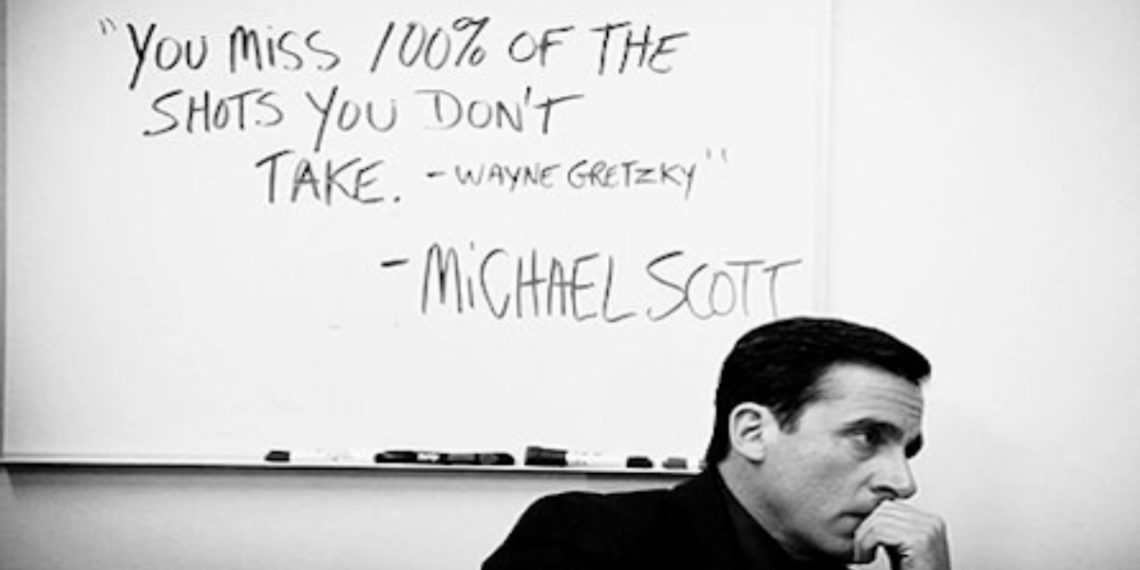
The $150 Rubber Band, and How I Got It for Free
“You never know until you try.” That’s a statement I’m sure most are familiar with in some shape or form. Though, personally, I like to go with Wayne Gretzky’s quote that was made famous by The Office’s Michael Scott:
“You miss 100% of the shots you don’t take”
This mindset is something I’ve always known about, but honestly, never actively applied too much in my day-to-day life. These adages imply taking on a certain amount of risk.
And risk can be scary.
Like most people, I’m not a fan of conflict. Putting myself out there and requesting things that are out of the norm can elicit feelings of uncertainty. But more and more, I’ve come to the realization that more often than not, I’ve got nothing to lose by simply trying.
And in the world of Being Nerdy, there are some testimonies that I’d like to share where much was gained by way of taking a chance.
Testimony 1: The Cloth Pouch
If you’ve been following me for any amount of time, you are probably aware of my affinity for tabletop and board games. It’s one of my favorite hobbies, and is a pastime I cherish when I carve out the time for it. Nothing, in my opinion, quite compares to the experience of having tangible, visceral components that you utilize in an interactive setting with other people.
One downside to these physical components, however, is the wear and tear factor that is associated with them. As with most objects, repeated use will eventually result in some form of breakdown. (science buffs might recognize this as the 2nd Law of Thermodynamics)

A popular game for my group is Sheriff of Nottingham. It’s a great entry-level board game featuring elements of bluffing, bribing, and point acquisition. One of the most enjoyable aspects of Sheriff is smuggling various types of goods (or “contraband”) cards in these little cloth pouches that provide a satisfying “click” noise when snapped shut.
After what was maybe our 10th playthrough, one of these pouches broke, with the button facilitating that “click” having popped off.
As someone who is a bit of a perfectionist in having all game bits in decent condition, I was somewhat disappointed. I even briefly considered buying a whole new copy of the game just to have all of the components in tip-top shape (obsessive, I know).
On a broad scale, in countless other instances where something goes awry with a beloved possession, I usually take one of three predictable courses of action:
- Accept my fate and live with it.
- Discard the object because it isn’t up to my standards.
- Buy a whole new thing to replace the defective object.
But one idea occurred to me: why not just reach out to the company for a replacement part? Honestly, this was not really something I had thought about before. Could just simply reaching out to the game’s company, Arcane Wonders, make a difference?
I figured what the heck, why not try?
So I spent ten minutes penning a simple email. I told them the situation — that a crucial game component had taken damage — and asked if there was some way that I could buy a replacement part.

Not more than a few days had gone by when I received a response from their customer service team. They told me to provide my shipping address, and that they would happily send over the replacement component at no additional charge.
Shortly thereafter, not only did my replacement pouch arrive, but Arcane Wonders had also sent me a limited edition contraband card.
They went above and beyond my request, sending me the piece I needed and then some.
All because I took a moment to ask.
Testimony 2: The $150 Rubber Band
Along the same lines, I had something similar occur with my Playstation VR headset. The device was one that had seen a lot of love from me. With many hours poured in games like Superhot, Moss, and Astro Bot: Rescue Mission, it was inevitable for the peripheral to lose its structural integrity after a while.

The part that gave way was a little component not unlike a rubber band. This minute but crucial piece of hardware provided elasticity for the part of the headset that went around one’s head, keeping it anchored in place. There were two of these, one on each side of the headset, functioning as a single unit to ensure a comfortable virtual reality experience.
Then on one fateful day, one of these rubber bands snapped. I was now left with a headset that felt tight on one side, and loose on the other.
Not ideal for VR immersion.
I immediately began the process of research. I looked at PSVR breakdown articles, learning how to disassemble the headset to see if I could DIY the thing and homebrew some sort of repair.
No luck. The rubber band was quite unique and proprietary.
I then looked at buying a replacement rubber piece online. Someone in the world must’ve had a similar incident, creating demand for these parts, right?
WRONG.
No results were found after poring through listing after listing on Amazon and Ebay.
I then resorted to looking at Sony’s return/replace policy, hoping that I would be covered by the warranty. Unfortunately, that too was out of the question, as I had owned the headset for 3 years — far longer than the one year period that the warranty covered post-purchase. And sending the device in for the standard repair cost was exorbitant: $150 just to swap out the rubber band.

But I’m glad it’s there.
*sighs*
It seemed that I was stuck between a rock and a hard place. I could either endure the lopsided headset the way that it was, or be $150 poorer to sate my perfectionist propensities.
Then it occurred to me: why not ask Sony for a replacement part?
Fearing an email to the Sony team might get lost in the shuffle, I resolved to call the tech company directly to address the situation. After going through several call prompts and waiting rooms, I finally reached a live human being.
After I presented my case, the PSVR specialist informed me that they would be sending me not only one rubber band, but two. This way, I could replace both components on the left and ride side of the headset, alleviating any concern that the other band could snap.
A couple of weeks later, I was back in the world of PSVR. And comfortably so.
Testimony 3: Horsetrading for Internet
One last testimony I have is arguably the most impactful of the anecdotes I’ve provided so far.
It involved some tactful negotiation.
Where I live in the Pacific Northwest is not necessarily the most conducive to faster internet speeds. North Idaho is not what I’d exactly call a “thriving metropolis,” and probably not the biggest priority for Google in implementing their Fiber network.
Thus, that leaves very few options for consumers when it comes to Internet Service Providers in my area. And those ISP’s that do exist can afford to charge insane prices for less-than-satisfactory speeds.

*cries*
Still, I bit the bullet and went with the one broadband network we could receive in our neck of the woods. $60/month for 3 Mbps download speeds is a tough horse pill to swallow, but I had no other options.
And for a couple of years, that is what we had.
During that period, I worked at a digital marketing agency. Being in this environment taught me a lot of things. One of the principles I learned is that it is much easier to retain a current customer than it is to obtain a new one.
I also knew our ISP offered “premium” service tiers for higher costs, but I wasn’t about to pay more than I already was. A little fed up with the expensive monthly bill for our crappy speeds, I called up the hotline and gave them an ultimatum.
I demanded an upgrade for the current rates I was paying.
Or else I’d find an “alternate option” for internet.
It’s important to note that I’m no stranger to horse-trading. I’ve been to many places around the world that lend themselves to making deals, such as flea markets and recycle shops. But this was a whole new ball game; something I had never attempted before: trying to negotiate a rate that was, supposedly, set in stone.

As expected, the customer service representative was taken back by my straightforward request. I was polite, but direct. If the ISP refused to upgrade us to the next tier at our current monthly rate, I’d be moving my business elsewhere.
I was, to a minor extent, also bluffing. Sure, there were other ways to get internet in our neighborhood, but this ISP basically monopolized our area for broadband. Hence the ridiculous rates they could afford to charge.
But I figured, what’s the worst that could happen? Worst case scenario, the guy laughs in my face and tells me to screw off.
But he neither laughed nor told me to screw off. Instead, the flustered representative put me on hold, while he notified his manager of the difficult costumer he was currently dealing with.
After several tense minutes, the guy returned and told me simply:
“We can do that.”
He then strongly pleaded with me to not cancel the subscription anytime soon, as that would reflect badly on him. I reassured the representative I wouldn’t do any such thing (we were stuck with this ISP regardless), and thanked him for his help.
After hanging up, I was ecstatic. I couldn’t believe that’s all it took.
One ten minute phone call was all that was needed to save me hundreds of dollars in the long run with this ISP.
Tying It All Together
Suffice to say, the notion of stepping out in spite of uncertainty is not a new one. And it certainly doesn’t exclusively apply to the Realm of Nerdom.
But it’s a mindset that I know is not an easy one to curate. It’s not fun to indulge in any sense of conflict. Heck, I delayed that phone call to our local ISP for weeks, because I was afraid of the ramifications. I had so many questions bouncing around in my head:
- How am I going to phrase this?
- What if I mess up what I want to say?
- What if I get made fun of?
It was like overcalculating the logistics of a first date.
But in reality, sometimes just taking the plunge is what needs to take place. It’s scary in the moment, but if you don’t have anything to lose, why fear the jump? Better a few moments of uncertainty than a lifetime of regret for not taking action.

My point for this post is not to show how awesome I am at negotiating or requesting things, or that you will always see success in stepping out. You won’t always win others to your side, and no, I don’t usually enjoy the process of asking. But I do find that more often than not, it’s a mental roadblock I need to overcome, and one that can yield benefits if I take that step.
There’s no harm in simply asking.
So go out there. Ask that person out. Explore that new hobby. Spelunk that cave you’ve been eyeballing for weeks.
You never know until you try.




